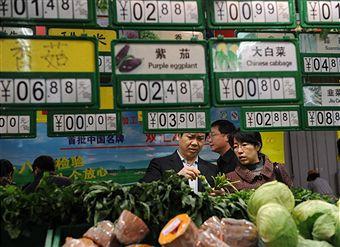
Many Chinese above the age of 35 who grew up in the countryside can clearly remember the first time they ate meat because it was such a rare and delicious moment.
Quite a few Chinese friends say that the first time they tasted cooked animal flesh, usually at around the age of 10 or so, they vowed they would be content with their lives if only they could eat it once a week. Of course, many of those same people now drive expensive cars, live in large villas and eat seafood and foie gras imported from the other side of the world.
But the digestive memory and the relative poverty of many of the country's citizens goes some way towards explaining a strange phenomenon revealed in the latest Chinese central bank "price satisfaction" survey.
The survey shows Chinese households are more dissatisfied with inflation than at any time since the survey began in the fourth quarter of 1999, with 74 per cent of respondents saying prices are now "unacceptably high".
The strange thing is that Chinese households are apparently much more angry about price rises now, when the official monthly inflation reading has just hit 5.1 per cent, than they were back in early 2008, when inflation peaked at close to 9 per cent.
A look at what was driving price rises then and what is driving them now gives a possible clue as to why people seem more upset now, despite the lower headline inflation figure.
In 2008, pork and other meat products were rising the fastest and pushing up overall inflation figures while price increases in the last couple of months have been driven to a large extent by more expensive vegetables.
China is still a relatively poor country in aggregate terms and for many people meat is still something of a treat.
But vegetables are their staple diet and so when their prices start to spike ordinary citizens feel the pinch more acutely.
Vegetables in China today are nearly a third more expensive than last year-part of a larger inflation problem which China's Premier Wen Jiabao vowed last month to fix through price controls. The lack of change in rising prices then explains why people are dissatisfied.
For sure, if one goes by price controls in 2008, Chinese citizens have a way to go before serious inflation is controlled. And this time how Beijing manages inflation will matter a whole lot more.





